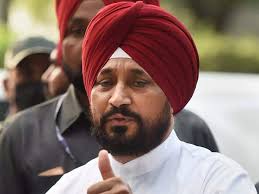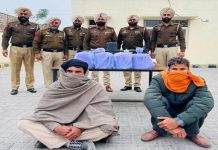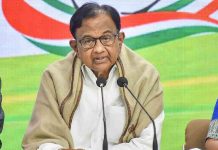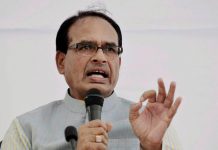The recent multi-cornered Lok Sabha election in Punjab has sprung notable results for all the political majors. While Congress has succeeded in retaining its grip on the state, the results have left the ruling AAP, which had swept the 2022 Assembly polls, chastened. A report by Rajesh Moudgil

The June 1 general elections in Punjab which gave Congress seven out of total 13 Lok Sabha seats and three to ruling Aam Aadmi Party (AAP), show the Congress as the biggest gainer in the state in which ruling AAP had won 2022 assembly polls with a historic win of 92 out of total 117 assembly seats.
The Shiromani Akali Dal (SAD), which is the biggest regional party, on the other hand, could win just one and the BJP failed to even open its account.
The voters of the state also elected two pro-Khalistan Sikh radical independents – Amritpal Singh and Sarbjit Singh Khalsa – from Khadoor Sahib and Faridkot seats, respectively. This election also had an unprecedented show of party hoppers.

The Congress had won eight seats in the 2019 general elections and faced a brutal drubbing in the 2022 state election when the Aam Aadmi Party (AAP) not only registered a landslide victory by winning 92 out of the total 117 assembly seats, but also decimated Congress’ vote-share. The Congress which had about 40% vote share and 18 MLAs, has come down to about 26% this time, but has bagged seven seats across the trio regions of the state – Malwa, Majha and Doaba.
It has won Ludhiana, Ferozepur, Fatehgarh Sahib (SC) and Patiala (Malwa), two seats – Gurdaspur and Amritsar (Majha) and Jalandhar (SC) seat (Doaba).
Former chief minister Charanjit Singh Channi has come out as one of the Congress’ giant killers this time who has won the Jalandhar (SC) seat by a huge margin trouncing BJP’s Sushil Rinku, who was Congress’ own sitting MLA from Jalandhar West till recently but had hopped over to the saffron party along with another sitting MLA Sheetal Angural.
The two other prominent winners of Congress are Dr Dharamvira Gandhi and state party chief Amarinder Singh Raja Warring. While Gandhi defeated former Congress stalwart and four-time MP Preneet Kaur who had recently joined BJP from Patiala, Warring trounced his party’s turncoat and two-time MP Ravneet Bittu from Ludhiana.
The remaining four Congress winners are: Gurjeet Singh Aujla from Amritsar, Amar Singh from Fatehgarh Sahib, Sher Singh Ghubaya from Ferozepur and former deputy chief minister Sukhjinder Singh Randhawa from Gurdaspur.
AAP humbled
Even though Punjab once again became the only state in the country to have elected AAP MPs since 2014 general polls, its score of three out of 13 this time, appears far from being impressive given its ambitious target of winning all the 13 seats this poll season.
The party which had a brute majority in the state assembly and which had fielded at least five Cabinet ministers and many more MLAs failed to yield desired results.
The AAP in Punjab had seen four of its candidates triumphing in 2014 LS Election– Bhagwant Mann from Sangrur seat, Dharamvira Gandhi from Patiala, Harinder Singh Khalsa, Fatehgarh Sahib and Prof Sadhu Singh from Faridkot, and only one in 2019 – Bhagwant Mann.
However, since Mann had vacated his Sangrur seat and won Dhuri assembly seat and became the chief minister, the vacated seat was bagged by Shiromani Akali Dal (Amritsar) chief Simranjit Singh Mann, also a Khalistan sympathiser.
However, the AAP’s Sushil Rinku won the Jalandhar Lok Sabha seat after the demise of Congress’ sitting MP Santokh Choudhary, during the Rahul Gandhi-led Bharat Jodo Yatra. Rinku hopped over to BJP recently, but eventually lost to Channi.
The AAP’s three nominees who have won this election are Gurmeet Singh Meet Hayer from Sangrur ousting Simranjeet Singh Mann of SAD (Amritsar), Raj Kumar Chabbewal from Hoshiarpur seat and Malvinder Singh Kang from Anandpur Sahib seat.
SAD reduced to single seat
Meanwhile, even though the Harsimrat Kaur Badal of Shiromani Akali Dal (SAD) has succeeded in retaining her Bathinda seat and that too by doubling her previous margins of about 20,000, as many as 10 out its 13 candidates failed to save their deposits.
Both SAD and BJP had fought on all the 13 seats, alone. In most of the constituencies, the SAD finished a poor fourth.
The two candidates who could save their deposits are Anil Joshi, Amritsar seat, and Nardev Singh Bobby Mann, Ferozepur.
The party’s vote share has also slided – from 27.76% in 2019 to 13.53% this time.
The BJP which also went solo on all the 13 seats, failed to even open its account, though it recorded 18.56% vote share – about 5% more than its former ally SAD.
The poll data also showed that BJP’s performance in 35 out of total 117 assembly segments, which were Hindu, urban or semi-urban areas, had significantly improved and the saffron party finished second in seven seats – Jalandhar west, Jalandhar cantt, Amritsar west, Fazilka, Anandpur Sahib, Sahnewal and Dinanagar.
While the issues like Ram Temple and Modi wave did have a positive impact, the farmers’ ire went against it.
Radicals spring a surprise
Meanwhile, the victory of two pro-Khalistan Sikh radical independent candidates also seem to have potential to create a disquiet in the state, poll observers have opined.
The two candidates are – pro-Khalistan radical Sikh preacher Amritpal Singh, 31, who is lodged in Dibrugarh jail (Assam) under NSA and Sarabjeet Singh Khalsa, 45, who is son of former Prime Minister Indira Gandhi’s assassin Beant Singh.
They fought from Khadoor Sahib and Faridkot Lok Sabha constituencies, respectively, as independent candidates and won by huge margins.
The campaigning for Amritpal was primarily done by his parents and supporters and the Shiromani Akali Dal (Amritsar) incumbent MP from Sangrur seat, Simranjit Singh Mann, also a pro-Khalistan leader, had withdrawn his candidate in support of Amritpal.
Amritpal’s supporters portrayed him as an “anti-drug crusader’’ and recalled the campaigns he aggressively conducted, which were primarily against the drugs, rampant across the state. They also laud the “amrit sanchar’’ (Sikh initiation ceremony) conducted by the radical Sikh preacher. They, however, maintain radio silence on Amritpal’s stances on Khalistan or distrust in the Constitution of India.
He had hit the headlines after he along with a score of his supporters stormed Ajnala police station in Amritsar on February 23 last year, demanding release of one of his aides booked in a case of assault and abduction. He surrendered before police on April 23, last year, after Punjab police launched a hunt to nab him and his aides.
Sarabjeet Singh, on the other hand in Faridkot, faced BJP’s Hans Raj Hans, a noted sufi singer, cine actor, singer Karamjit Singh Anmol, SAD’s Rajwinder Singh Dharamkot, Congress’ Amarjit Kaur Sahoke
Sarabjeet during his campaign, raised the Panthic chord and drew responsive gatherings. He also had backing of Sikh leaders who were part of 2015 Bargari protests against sacrilege – including former Akal Takht Jathedar Jasbir Singh Rode and former AAP leader Justice Jora Singh.
Notably, Sarabjeet’s mother Bimal Kaur Khalsa had won from the Ropar Lok Sabha election and his grandfather Such Singh from Bathinda Lok Sabha seat in 1989 as SAD candidates, though this time, the SAD had fielded its own candidate against him.
Sarabjeet Singh during his campaign highlighted the Panthic issues and how his father Beant Singh had avenged the attack on the Golden Temple in 1984 – during the army’s Operation Blue Star.
Meanwhile, the sitting MP from Sangrur, Simranjit Singh Mann, who heads his Shiromani Akali Dal (Amritsar), also a Khalistan sympathiser, faced the drubbing as ruling Aam Aadmi Party (AAP) candidate Gurmeet Singh Hayer won the seat defeating his nearest rival Congress’ Sukhpal Khaira by a margin of over 1.9 lakh votes.













